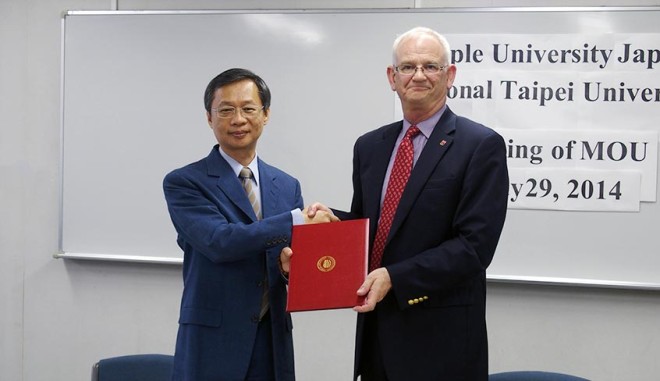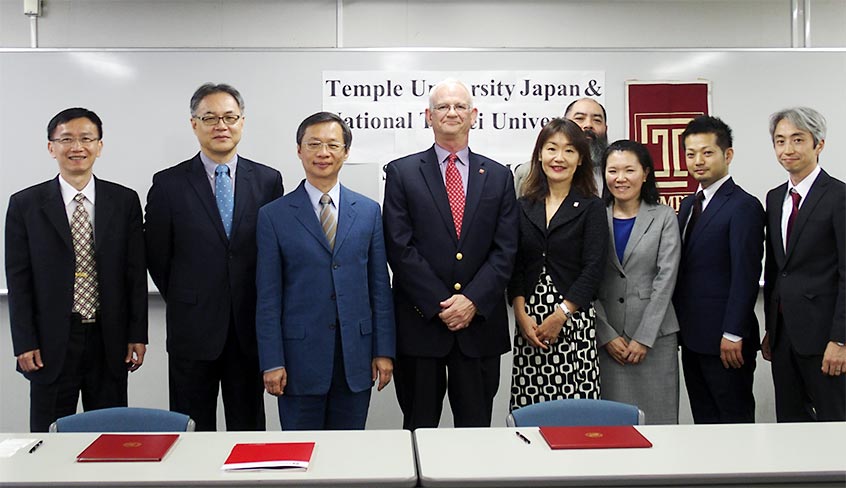At a ceremony in Azabu Hall at Temple University, Japan Campus (TUJ) on May 29th , TUJ and National Taipei University (NTPU) signed a Memorandum of Understanding (MOU). TUJ welcomed a delegation from NTPU, headed by President Fujiing N. Shiue along with Dean Tai-Hsi Wu of the Office of International Affairs and Commissioner Chorng-Jian Liu of the National Communications Commission.
The purpose of this MOU is to promote academic collaboration between TUJ and NTPU that will explore, facilitate and sustain academic programs, joint research, cultural exchanges, and other educational initiatives.
Possible areas of collaboration:
- Exchange of faculty and staff members
- Exchange of students
- Joint research projects
- Shared grants and sources of funding
- Other joint educational and cultural programs

NTPU signed an MOU with Temple University Main Campus in Philadelphia in April, 2010 as the basis for programs such as exchange initiatives, a summer workshop hosted on the Temple University Main Campus, and 3+2 programs jointly developed with several colleges of Temple University. The relationship between NTPU and TUJ makes much sense as NTPU is expanding strategic collaboration with higher education institutions in other parts of Asia as well as in Japan, and TUJ is the Asian Hub for Temple University.
Comments from President Shiue and Dean Wu – About the progress of internationalization and globalization of higher education in Japan and Taiwan
President Fujiing N. Shiue
I understand Japan is trying hard to globalize higher education, and the same is true in Taiwan. We, at NTPU, are focusing on collaborations with universities in the Asia-Pacific region in recent years. We have good experiences with Japanese universities and are very impressed with their active involvement. The focus of our collaboration initiatives with universities is on: 1) joint research and 2) faculty and student exchange. With joint research, we aim to be ranked higher in world university rankings and to improve academic performance. With faculty and student exchange, we want to encourage our students to go abroad and acquire international experience through studying, volunteering and internships. We expect one out of three students will have international experience while at NTPU by 2016.
Dean Tai-Hsi Wu
We have nearly 140 affiliated universities around the globe, and Japan is still one of the preferred destinations for Taiwanese students. As the president mentioned, student exchange in the Asia-Pacific region is an important part of our focus now. We host 70 to 80 students from abroad and send about 60 to 70 of our students overseas each year. As for summer programs, we sent 142 students abroad last year, and we expect to increase the number to 250 this year and to 350 to 400 next year.
About National Taipei University (NTPU)
Started as Taiwan provincial College of Public Administration in 1949, NTPU was reorganized from the Law and Business College of National Chung-Hsin University in 2000. Based in New Taipei City, NTPU continues to play a major role in fostering leading talents in the fields of law, business, public administration, and social sciences. A list of outstanding alumni includes Chen Yung-Tai, Chairman of the AURORA Group and Perng Fai-nan, Governor of Central Bank of the Republic of China (Taiwan).
Comment from Bruce Stronach, Dean, TUJ
TUJ has recently developed several MOUs with Japanese universities in order to give our students expanded educational opportunities in Japan and as a means of fulfilling our mission to support the internationalization of higher education in Japan. Our new relationship with NTPU is a felicitous expansion of both objectives in that our students and the students of our Japanese partner institutions will be able to take advantage of the education benefits NTPU has to offer, while allowing NTPU students an English-language based platform to study in Japan. In addition, it allows TUJ to advance its role at the center of Temple University’s international strategy in Asia.

